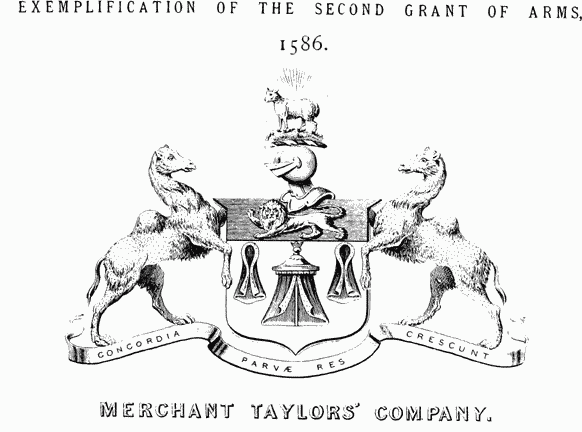Memorials of the Guild of Merchant Taylors of the Fraternity of St. John the Baptist in the City of London. Originally published by Harrison, London, 1875.
This free content was digitised by double rekeying. All rights reserved.
'Memorial XVI: The Second Grant of Arms, 1586', in Memorials of the Guild of Merchant Taylors of the Fraternity of St. John the Baptist in the City of London, ed. C M Clode (London, 1875), British History Online https://prod.british-history.ac.uk/no-series/taylors-guild-london/pp98-100 [accessed 26 April 2025].
'Memorial XVI: The Second Grant of Arms, 1586', in Memorials of the Guild of Merchant Taylors of the Fraternity of St. John the Baptist in the City of London. Edited by C M Clode (London, 1875), British History Online, accessed April 26, 2025, https://prod.british-history.ac.uk/no-series/taylors-guild-london/pp98-100.
"Memorial XVI: The Second Grant of Arms, 1586". Memorials of the Guild of Merchant Taylors of the Fraternity of St. John the Baptist in the City of London. Ed. C M Clode (London, 1875), British History Online. Web. 26 April 2025. https://prod.british-history.ac.uk/no-series/taylors-guild-london/pp98-100.
XVI. THE SECOND GRANT OF ARMS IN 1586. (fn. 1)
To all and singular as well Nobles and Gentles as others to whom these presents shall come, be seen, heard, read, or understood, Robert Cooke, Esquire, alias Clarencieulx, King of Arm and principal Herald of the East, West, and South parts of this Realm of England, sendeth Greeting in our Lord God everlasting:
Forasmuch as anciently from the beginning the valiant and virtuous acts of excellent persons have been commended to the world with sundry monuments and remembrances of their Good deserts.
Amongst the which the chiefest and most usual hath been the bearing of Signs and Tokens in Shields, called Arms, being evident demonstrations and testimonies of prowess and valor diversely distributed according to the qualities and deserts of the persons meriting the same, which order as it was prudently devised to stir up and inflame the hearts of men to the mutation of virtue, even so hath the same been continued from time to time, and yet is continually observed; to the intent that such as have done commendable service to their Prince or Country, either in war or peace or otherwise by the laudable and courageous enterprise or proceedings of any person or persons in the augmentation of the estate or commonwealth of the Realm or Country, might thereby both receive due honor in their lives, and also derive the same successively to their posterity and successors after them.
And whereas King Henry the Seventh by his Letters Patents, bearing date at Westminster the 18th year of His Reign, did incorporate the men of the Art or Mystery of Merchant Tailors of the Fraternity of St. John Baptist, within the City of London. And that they should be a perpetual Commonalty, and yearly choose one Master and four Wardens of the men of the Fraternity aforesaid to oversee, rule, and duly govern the said Fraternity, and all and singular the men of the same Fraternity, and that they should have a perpetual succession and one Common Seal for the necessary business of the same Fraternity to serve them for ever: which Fraternity have of long continuance borne Arms, helm, and crest, which arms and crest to the knowledge of such as be skilful in that faculty, being found to be over much intricate with confused mixtures of too many things in one shield contrary to the lowed and commendable manner of bearing of arms.

The second grant of arms, 1586
I, therefore, the said Clarencieulx, King of Arms, at
the instant request of William Widnell, Master of the said
Fraternity, and Reignold Barker, Nowell Southerton, William
Saulte, and Henry Webbe, Wardens of the same Fraternity,
have thought good to yield them my help only reforming
and altering of the same arms and crest; but for a further
declaration of the worthiness of the said Fraternity, do grant
unto them these supporters hereafter following: which arms,
crest, and supporters is thus blazed: that is to say, the field
silver, a pavilion with two mantles imperial purple garnished
with gold on a chiffe azure, a lion passant gold, and to the crest
upon the helm on a wreath silver and azure on a mount (vert), a
lamb silver in the sunbeams gold, mantled gules doubled silver,
and supported with two camels gold, as more plainly appeareth
depicted in this margin, which arms, crest, and supporters, I the
said Clarencieulx, King of Arms, by power and authority to me
committed under the Great Seal of England, do ratify, confirm,
give, and grant to the said Master and Wardens, and to their
successors in like place and office, and to all the men enfranchized of the said Fraternity, they the same to use, bear, and
show far ever, in all places honest to their honor and worship, in
shield, standard, banners, pennons, streamers, pencil, or otherwise at their liberty and pleasure without impediment, let, or
interruption of any person or persons. In witness whereof I the
said Clarencieulx, King of Arms, have hereunto subscribed my
name, and thereto put the seal of my office, the 23rd day of
December, in the year of Our Lord God 1586, and in the 24th
year of the reign of our most Gracious Sovereign Lady Queen
Elizabeth.
Robt. Cooke,
alias Clarencieulx,
Roy D'Armes.